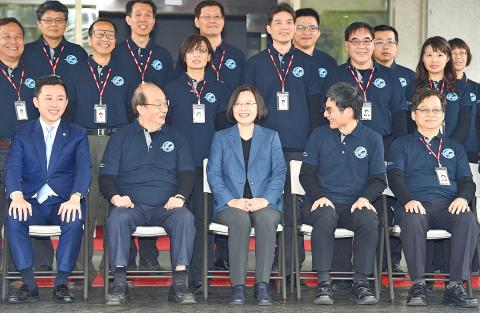The Formosat-7/COSMIC-2 satellite constellation would bolster national security by collecting more weather data, President Tsai Ing-wen (蔡英文) said yesterday as she inspected the Ministry of Science and Technology’s preparations for the next launch.
The Formosat-7 constellation, the biggest Taiwanese-US collaboration, is designed to collect more weather data for national defense and disease prevention purposes, Tsai said while visiting the National Space Organization (NSPO) at the Hsinchu Science Park (新竹科學園區).
The nation demonstrated its ability to develop space technology when Formosat-5 — Taiwan’s first domestically developed remote sensing satellite — was launched from Vandenberg Air Force Base in California on Aug. 25, 2017, she said, adding that the government would continue to support space technology development to make Taiwan an indispensable part of the global supply chain.

Photo: Liao Chen-huei, Taipei Times
After inspecting the organization’s integration and testing facilities, Tsai presented the constellation’s certification of flight readiness to NSPO Director-General Lin Chun-liang (林俊良).
The successor to the Formosat-3 constellation, dubbed “the world’s most precise thermometer in space,” the Formosat-7 constellation is expected to collect three to four times more data than its predecessor, Lin said.
It would be transported to the John F. Kennedy Space Center in Florida by China Airlines cargo aircraft and launched on a Space Exploration Technologies Falcon Heavy launch vehicle, he said, but added that the agency is still waiting for the US to set a launch date.
Formosat-7’s six mission satellites were manufactured by the Surrey Satellite Technology in England, a unit of Airbus Defense and Space, and are each equipped with three US-made instruments: the Tri-GNSS Radio Occultation System, an ion velocity meter and a radio frequency beacon, Lin said.
A seventh satellite, the Formosat-7R, also named Triton or “wind hunter,” was developed by the NSPO and would be launched next year at the earliest, NSPO Deputy Director-General Yu Shiann-jen (余憲政) said, adding that the agency would open an international tender for its launch.
Developing key satellite components is crucial to the nation’s third space program, which runs from this year until 2028, when it plans to launch six pilot high-resolution remote sensing satellites, two ultra-high-resolution remote sensing satellites and two synthetic aperture radar satellites, Minister of Science and Technology Chen Liang-gee (陳良基) said.
The program’s first remote sensing satellite is expected to be launched in 2021, Chen said.
In addition to the NSPO, academic and industrial resources would be involved in the program when necessary, he said, adding that many academics are keen to work on space exploration projects.

Taiwanese can file complaints with the Tourism Administration to report travel agencies if their activities caused termination of a person’s citizenship, Mainland Affairs Council Minister Chiu Chui-cheng (邱垂正) said yesterday, after a podcaster highlighted a case in which a person’s citizenship was canceled for receiving a single-use Chinese passport to enter Russia. The council is aware of incidents in which people who signed up through Chinese travel agencies for tours of Russia were told they could obtain Russian visas and fast-track border clearance, Chiu told reporters on the sidelines of an event in Taipei. However, the travel agencies actually applied

Japanese footwear brand Onitsuka Tiger today issued a public apology and said it has suspended an employee amid allegations that the staff member discriminated against a Vietnamese customer at its Taipei 101 store. Posting on the social media platform Threads yesterday, a user said that an employee at the store said that “those shoes are very expensive” when her friend, who is a migrant worker from Vietnam, asked for assistance. The employee then ignored her until she asked again, to which she replied: "We don't have a size 37." The post had amassed nearly 26,000 likes and 916 comments as of this

New measures aimed at making Taiwan more attractive to foreign professionals came into effect this month, the National Development Council said yesterday. Among the changes, international students at Taiwanese universities would be able to work in Taiwan without a work permit in the two years after they graduate, explainer materials provided by the council said. In addition, foreign nationals who graduated from one of the world’s top 200 universities within the past five years can also apply for a two-year open work permit. Previously, those graduates would have needed to apply for a work permit using point-based criteria or have a Taiwanese company

The Shilin District Prosecutors’ Office yesterday indicted two Taiwanese and issued a wanted notice for Pete Liu (劉作虎), founder of Shenzhen-based smartphone manufacturer OnePlus Technology Co (萬普拉斯科技), for allegedly contravening the Act Governing Relations Between the People of the Taiwan Area and the Mainland Area (臺灣地區與大陸地區人民關係條例) by poaching 70 engineers in Taiwan. Liu allegedly traveled to Taiwan at the end of 2014 and met with a Taiwanese man surnamed Lin (林) to discuss establishing a mobile software research and development (R&D) team in Taiwan, prosecutors said. Without approval from the government, Lin, following Liu’s instructions, recruited more than 70 software